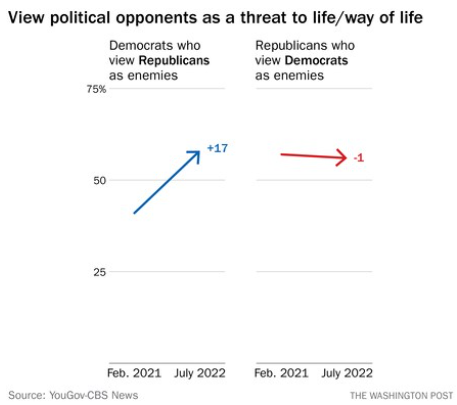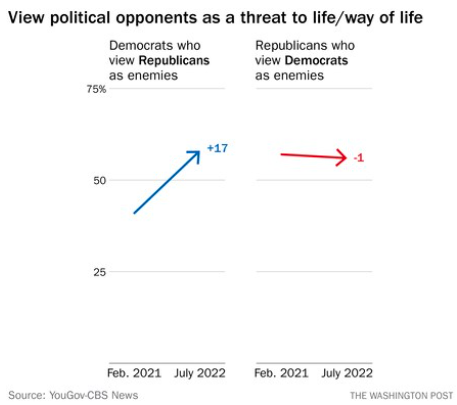Spam Filters … or Badly Behaved Hippos?
Conservative radio host Erick Erickson had a great post about the email fundraising wars.
Earlier this year, a North Carolina State University study found that Google “flagged more Republican campaign emails as spam than Democratic emails during the 2020 election season, and ended up sending as few as 32% of GOP emails to inboxes.” Republicans argue that this bias has cost them upward of $2 billion in small-dollar donations they could have raised from email solicitations.
And indeed, Axios reported just last week that “Democrats across the 10 most competitive Senate races are out-raising Republicans by more than $75 million among small-dollar donors — those giving less than $200 — according to an Axios analysis of Federal Election Commission records.”
But Erick has a different take.
The consultant class of the GOP is pushing the mythology that Google and Apple are flagging their emails because tech companies hate Republicans. I’ve spent a week on the phone with many Republican consultants, including those tied to campaigns whose emails make it to my inbox. They all tell me the same thing — the problem is not Google or Apple, but the GOP consultant class.
So how exactly does this work? Again, I think Erick does a nice job explaining:
I talked to a Democrat consultant who tells me that his organization is very careful in how they steward emails in order to avoid tripping the spam filters. They spread out emails. They do not share emails. And they are careful when sending, how often they send, and how the batch sends.
That is good email stewardship.
I can tell from the volume I am getting from GOP consultants that they are abusing their email lists.
One GOP consultant told me he is familiar with a group that pitched his team on sharing email lists for greater revenue. He said the nationally known group that does a lot of work for party leaders and gets its emails regularly flagged sends six times a day and has duplicated its email list to route through three internet companies so a single person just might get eighteen emails a day.
I’d add that I think the Trump monolith on the right has contributed to the lopsided stewardship issue as well. In the past, email lists were a precious thing and nobody wanted to “burn their list” by sending too many emails because—set aside the spam filter problem—your donors would eventually tune out and stop giving. That would make the email addresses useless. But Trump and his affiliated organizations were raising such a large percentage of the money on the right that they ended up setting the pace on the right. And they didn’t mind burning lists either, because they were so fixated on the short-term needs of a presidential campaign or because they thought the well was deeper than it was.
It’s a classic tragedy of the commons. If the biggest hippo is eating at an extreme pace, all the other hippos are forced to start eating more quickly to keep up, eating the water plants down to the nubbins, even if they know it means they’ll run out of food because the stalks have no time to grow back. It’s starve now or starve later.
All the more so because all of these campaigns rent each other’s lists—so if you know that one person renting the list is going to burn it, the incentive is for everyone to send as many emails as quickly as possible. That, of course, eventually trips the spam filter.
There’s no such race to the bottom on the left. Their hippos are spacing out their meals and ensuring that their seagrass has the chance to grow back before the next meal.
Bad News, America
From the Washington Post’s Philip Bump:
[T]here’s … an increase in the extent to which members of either party see the other side not as opponents for constantly adjudicated political power but, instead, as enemies.
In February 2021, soon after President Biden took office, CBS News and its pollster YouGov released data showing that most Republicans viewed Democrats in precisely that way. Asked to evaluate whether Democrats were political opponents (meaning that a Democratic win simply meant not getting desired policies) or enemies — “if they win, your life or your entire way of life may be threatened” — most Republicans identified the Democrats as enemies. Democrats, on the other hand, were more likely to call Republicans political opponents.
In research conducted last month, though, that’s changed. Now most Democrats call Republicans enemies in turn. There’s been a 17-point increase in the extent to which Democrats use that term to describe Republicans.
I don’t think these results need much explanation, but as Bump grimly summarizes, “When you view opponents as enemies instead of simply competitors, when you view electoral losses as more dire than temporary setbacks — the range of responses to actions you disagree with expands.”

Wisconsin Votes Today
It’s another battle between former President Donald Trump and his vice president, Mike Pence. In Georgia’s gubernatorial primary, Pence-endorsed Brian Kemp secured the nomination over Trump-endorsed former Sen. David Perdue. But Trump’s preferred candidates won handily in Arizona. The two go head-to-head again in Wisconsin today, but it’s worth remembering that these primaries aren’t *really* the test. Trump’s candidates can win every single primary—but if they lose in the general election, the “Trump wing” of the Republican Party doesn’t get any stronger.
It’s like the tension between the two types of Darwinian evolutionary forces. Your adaptation can help you outcompete all of the other males for food and survive to a ripe old age, but if that same adaptation makes you so horribly unattractive to females that you never produce offspring, then your adaptation wasn’t actually adaptive. (And of course the reverse is true, too: You can be the handsomest sparrow of the lot with a supersized red feather sticking out of your head, but if you get eaten first by a hawk, then it didn’t do you any good.)
Trump may be outcompeting Pence for Republican primary voters, but he has to compete for general election voters, too. And that’s what we have yet to see this cycle, whether it’s Doug Mastriano, the Republican nominee for governor in Pennsylvania who led the effort to overturn the results of the 2020 election in his state, or Kari Lake, the Republican nominee for governor in Arizona who has also run a campaign centered around contesting the results of the 2020 election: Can these candidates actually win?
Speaking of Wisconsin, it’s a weird state. Harvest Prude had a nice write up about it over on the website. Here’s a taste:
Though there are deep red and deep blue pockets in the Badger State, politics in Wisconsin are notoriously difficult to pin down. The state currently has a Democratic governor in Tony Evers, and senators from opposite parties: Johnson was first elected in the Tea Party wave of 2010 but fully embraced Donald Trump’s MAGA-style politics, while Democrat Tammy Baldwin is the state’s first female senator, as well as the nation’s first openly gay senator.
Trump is unpopular in the state according to state polls: Marquette Law University found in June that only 34 percent of respondents had a favorable view of the former president. But the same survey found President Joe Biden’s approval rating had sunk to a new low—just 36 percent as of June.
In 2016 Trump was the first Republican since Ronald Reagan to carry the state,, but he lost the state to Joe Biden by 20,000 votes out of more than 3 million cast in 2020.
The state’s largest GOP-leaning counties, the suburban Milwaukee “WOW” counties of Waukesha, Ozaukee, and Washington, soured slightly on Trump in 2020, and his margin of victory shrunk compared to 2016.
However, the Republican Party fared better down the ballot, aided by maps drawn in 2011 by GOP legislators: Republicans expanded the number of seats they controlled in the state Senate and shed only two seats in the State Assembly. Despite being outspent by Democrats, the GOP ultimately kept their majorities in the statehouse.
It’s unclear whether election concerns have the same resonance in more suburban areas.
You can read more as results roll in tonight here.
TV Is Still King
As reported by Axios, “Nearly $3.6 billion has been spent on political and issue ads so far this year, putting the 2022 elections on pace to obliterate 2018’s record as the largest midterm election year by ad spend.” This doesn’t surprise me at all. Although I question its effectiveness.
But here’s what does surprise me:

Broadcast television is STILL far and away the largest recipient of those ad dollars. There was a time 10 years ago when it really looked like digital would overtake TV in short order. It is cheaper, more targeted, and can raise both name ID and money at the same time. But it’s barely edging out cable TV. In fact, half of that digital spending is on “connected TV” meaning apps that stream on people’s TVs like Hulu and Apple.
I’m shocked. Political consultants still think they see movement in the polls when they place ads on local broadcast stations, but “political practitioners just don’t have confidence in streaming to move numbers the way they see it on broadcast and cable,” Eric Wilson, a veteran GOP digital strategist, told Axios. Perhaps it’s the type of people streaming at this point versus the medium itself. Or perhaps people are more adept at skipping ahead in their streaming apps but are more accustomed to being a captive audience during broadcast commercial breaks.
Regardless, as the number of broadcast television viewers declines, those ad dollars will presumably have to move elsewhere. And in the meantime, digital companies are struggling with how to manage their brands while running political ads that their audiences may disagree with.
Election Fact Check
I don’t post enough from our top notch fact checking team, but this headline caught my eye: “Fact Checking Claims About Dominion Voting Systems and the Colorado Recount.”
A recent article claimed that “Dominion Voting System machines failed a logic and accuracy test in El Paso County, Colorado, for the upcoming hand recount of the 2022 Primary election.”
Nope.
In an email to The Dispatch Fact Check, Annie Orloff, a spokeswoman for the Colorado secretary of state’s office, said that the “claim that the voting equipment test failed in El Paso County is false. There is no truth to the claim.”
First, some context on adjudication, which Orloff describes as “the number of times the voting system’s software identifies certain conditions on scanned ballots and sends them for human review to ensure the ballot is tabulated according to the voter’s intent.”
More simply, Orloff explained, “the Logic and Accuracy test ensures that the voting system is sending the correct ballots—ones with certain conditions like an undervote over vote —for adjudication.”
The false claims in The Gateway Pundit article and viral tweet, she noted, “are conflating voting equipment failure with additional ‘adjudication’ or scrutiny of ballots as required under rules for a recount.”
Orloff further explained that Colorado law requires “counties to program their voting systems to send for human review and adjudication” the following: ballots that are totally blank, ballots with overvotes, ballots with write-in votes, and ballots with marginal marks in ballot ovals.
You can read more here.







Please note that we at The Dispatch hold ourselves, our work, and our commenters to a higher standard than other places on the internet. We welcome comments that foster genuine debate or discussion—including comments critical of us or our work—but responses that include ad hominem attacks on fellow Dispatch members or are intended to stoke fear and anger may be moderated.
You are currently using a limited time guest pass and do not have access to commenting. Consider subscribing to join the conversation.
With your membership, you only have the ability to comment on The Morning Dispatch articles. Consider upgrading to join the conversation everywhere.